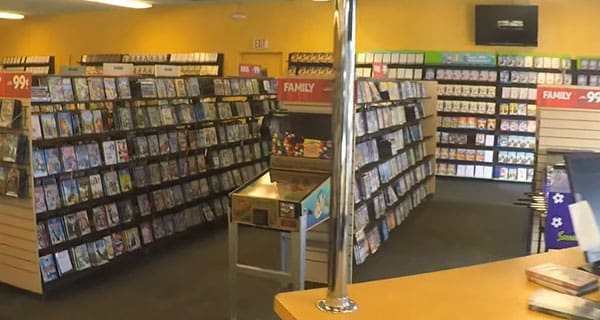 Just about every year before Christmas, I sit down next to my wonderfully decorated tree, often with a beverage in hand, and clean up my computer files.
Just about every year before Christmas, I sit down next to my wonderfully decorated tree, often with a beverage in hand, and clean up my computer files.
Inevitably, I’ll unearth a few column ideas I didn’t get around to writing. This year, I found one older topic that I’ve decided was still intriguing enough to turn into a piece.
So gather ’round as I tell you the tale of the last Blockbuster in America.
In the (ahem) prehistoric days before Netflix, Amazon Prime, YouTube and other streaming services, people used to rent videos. We would get them from either a video store or rental machine, watch our videos on VCRs, rewind and return them by a specific day and time – or get charged a late penalty.
There were several mom-and-pop video stores in my neighbourhood. Larger outfits like Rogers Video and Jumbo Video were readily available, too.
But the biggest and most successful chain was Blockbuster Video.
Founded by David Cook in 1985, it grew in the 1990s when Wayne Huizenga took control and bought out many competitors. Viacom purchased it for $8.4 billion in 1994, dropped the word “Video” in 1996, and turned Blockbuster into a household word. By 2004, this company reportedly employed 84,300 people (58,500 in the U.S. alone) and had 9,094 stores.
Netflix’s mail-order service, Redbox rental machines and video-on-demand ultimately destroyed Blockbuster’s revenues. It declared bankruptcy in 2010 and the satellite TV provider Dish Network bought out the remaining 1,700 stores. The brand was eventually eliminated, although a few franchise agreements were maintained.
By this summer, only three Blockbuster stores remained in the U.S.
Two of them were based in Alaska – in Anchorage and Fairbanks. Both were profitable but the profit margins were dwindling fast. HBO host/comedian John Oliver tried to help by sending a jockstrap worn by actor Russell Crowe in the movie Cinderella Man to display in the Anchorage store to drum up business.
It wasn’t nearly enough, however.
Blockbuster Alaska announced on its Facebook page on July 12 that it was closing both locations. Alan Payne, the Austin, Texas, based owner of the stores, told the Anchorage Daily News that day, “It’s always kind of a kick in the pants every time we close a store. But it’s been going on for so long that the shock has worn off, frankly. This is not going to come back. We can’t string this out any longer without creating some financial problems.”
This left one Blockbuster store in America, located in Bend, Ore.
Sandi Harding, the store’s general manager, told CNN on July 13, “It’s pretty exciting that we are the last holdout.” In an interview with the Washington Post on July 16, she noted, “Every day, even before this, people would drive by and see the ‘Open’ sign and say, ‘Oh my gosh. How are you still here? Why are you still here?’”
The last holdout is willing to fight for its survival.
“We all have licensing agreements and leases,” Harding said to CNN, “but as of now we have no plans on closing.” Two local filmmakers, Taylor Morden and Zeke Kamm, are documenting the last Blockbuster so that, as Morden told the Oregon Bulletin on Sept. 19, they “get [their] movie out and on the shelf at Blockbuster while there still is one.” A local brewery, 10 Barrel Brewing, even started selling The Last Blockbuster Sinister Black Ale this fall.
Good for them.
Alas, the harsh reality is the free market can only sustain a faltering enterprise like Blockbuster for so long. Consumer demands rapidly change, and new products are always waiting in the wings to replace existing ones. As Paul Tuns, editor-in-chief of The Interim, wrote in a July 18 tweet, “Someday people will be lamenting the decline of Netflix. Markets create and markets take away.”
But as we head into Christmas, we can take some solace in knowing that one flickering blue and yellow Blockbuster sign will make some people feel nostalgic during the holidays. And we didn’t even need Santa Claus to perform this miracle.
Troy Media columnist and political commentator Michael Taube was a speechwriter for former prime minister Stephen Harper.
The views, opinions and positions expressed by columnists and contributors are the author’s alone. They do not inherently or expressly reflect the views, opinions and/or positions of our publication.


